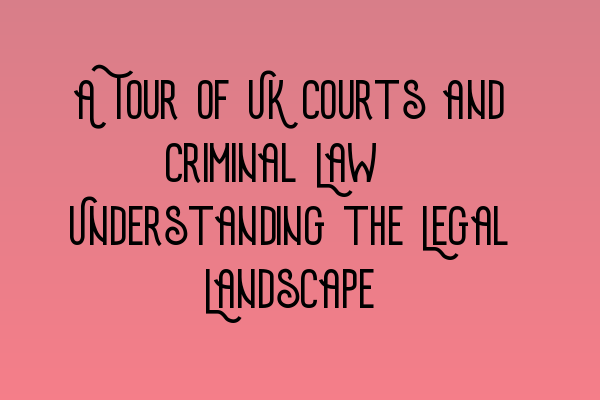A Tour of UK Courts and Criminal Law: Understanding the Legal Landscape
Welcome to SQE Criminal Law & Practice UK! In this blog post, we will take you on a tour of the UK courts and explain the intricacies of criminal law. Whether you are a law student, legal professional, or simply interested in the legal system, this article will provide valuable insights into the UK legal landscape.
The UK Court System
The UK court system is a complex hierarchy of courts with various jurisdictions. Understanding its structure is essential to navigate the legal landscape effectively.
The highest court in the UK is the Supreme Court. It deals with the most significant and complex legal matters, including constitutional issues and interpreting the law across all jurisdictions. Below the Supreme Court, we have the Court of Appeal and the High Court. These courts have the power to hear appeals and handle important civil and criminal cases.
At a lower level, we have the Magistrates’ Court and the Crown Court. The Magistrates’ Court deals with less serious criminal cases, while the Crown Court handles more serious offenses such as murder and robbery. It is worth noting that the Crown Court also deals with appeals from the Magistrates’ Court.
Now that we have a basic understanding of the court system, let’s dive deeper into criminal law in the UK.
Understanding Criminal Law in the UK
Criminal law in the UK is a branch of law that deals with offenses against society. It encompasses a wide range of criminal activities, from minor infractions to serious offenses. Understanding the principles and elements of criminal law is crucial for lawyers, judges, and defendants.
One of the fundamental principles of criminal law is the concept of actus reus, which refers to the physical act or conduct that constitutes a crime. This element must be proven beyond a reasonable doubt for a person to be convicted of a crime.
Another important concept is mens rea, which refers to the mental state or intention of the offender. Different crimes require different levels of intent, ranging from negligence to specific intent. Understanding the mens rea element is crucial in determining the culpability of the accused.
As criminal law is a vast and evolving area, it is essential to stay up-to-date with the latest legislation, case law, and legal precedents. This is especially crucial for law students and practitioners preparing for the SQE 1 and SQE 2 exams, which are now the qualifying exams for solicitors in England and Wales.
Preparing for the SQE Exams
If you are aspiring to become a solicitor in England and Wales, passing the SQE exams is a key requirement. To prepare effectively, it is essential to engage in rigorous study and practice. You can start by taking advantage of resources such as SQE 1 Practice Exam Questions and SQE 1 Practice Mocks FLK1 FLK2, which will help you assess your knowledge and identify areas for improvement.
Additionally, enrolling in professional SQE 1 Preparation Courses and SQE 2 Preparation Courses will provide you with comprehensive guidance and support from experienced solicitors. These courses cover all the necessary content and equip you with the skills required to excel in the exams.
To ensure you are well-prepared, it is crucial to stay informed about the latest SRA SQE Exam Dates and create a study plan that allows for sufficient time for revision and practice.
Conclusion
The UK courts and criminal law system are dynamic and multifaceted. Understanding their intricacies is vital for legal professionals and anyone interested in the legal landscape. By familiarizing yourself with the court structure, principles of criminal law, and preparing thoroughly for the SQE exams, you can embark on a successful legal career in criminal law.
We hope this tour of the UK courts and criminal law has provided valuable insights and sparked your interest in this fascinating field. If you have any questions or would like further information, please don’t hesitate to contact us. Good luck on your legal journey!
